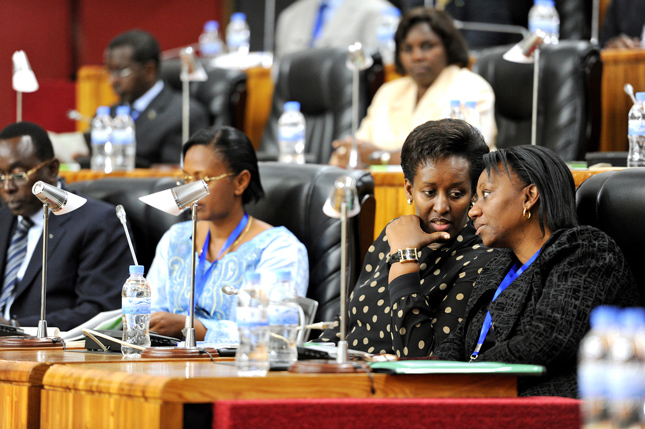By Jeannette Bayisenge
When the BBC reported recently that women were being trained to drive electric-powered motorcycle taxis in Rwanda, many readers were surprised. Not only was this an innovative, environmentally conscious line of work, but it’s also one that many might not regard as a typically female profession. Not in Rwanda, however, because we regard every job as gender neutral.
Rwanda has received a considerable amount of criticism in the news recently. No country is perfect, but there has been no recognition of everything that Rwanda has achieved since the 1994 genocide against the Tutsi – such as huge advances in female empowerment. I am proud to say that, today, Rwanda has the highest rate of female labour force participation not just in Africa, but the entire world.
- Why Nigerians should pay attention to humanitarian services – Rotarian Owonikoko
- Expect more revenue, best assets once Buhari unveils new NNPC – Kyari
Eighty-six per cent of Rwandan women are active in the national labour market. They also hold 55 per cent of government cabinet positions and 61.3 per cent of seats in our country’s parliament. For me, it is clear the leaps that Rwanda has made over the last 28 years wouldn’t have been possible without the contribution of the extraordinary women of our country.
In 1994, Rwanda was a nation in ruin. The horrors of the genocide against the Tutsi had left the economy crippled and our society damaged almost beyond repair. At the time, I never could have dreamed that we would find ourselves where we are today: in less than three decades, it is estimated that over a million Rwandans have been lifted out of poverty as a result of sustained economic growth. From 2005 to 2017, the proportion of the population living in extreme poverty was slashed from 35.8 to 16 per cent.
Today, we continue to work to get that number down to zero, but I firmly believe that we are on the right path to getting there and that this transformation would have never happened had Rwanda not unleashed the talents and abilities of the women of our country. This hasn’t only benefited our economy but has also helped change the fundamental nature of Rwandan society as well.
Pre-genocide Rwanda was a primarily paternalistic society, with little opportunity for women to assume leadership roles in government or wider society. But the atrocities that occurred in that period profoundly disrupted the old social order.
Early on, it was clear to the post-genocide government that women’s leadership and influence would be vital at a time where forgiveness, reconciliation, and peace building were desperately needed. So, from the outset, equality of opportunity and of representation was central to Rwanda’s reconstruction policies.
The empowerment of Rwandan women is intrinsically linked to our vision for the country and the transformation that our society has undergone since 1994. Female empowerment was and is one of the main driving forces of this transformation as well as one of its most valuable outcomes.
Research shows that improving gender equality helps foster reconciliation and peace-building, increases economic growth, reduces poverty, enhances societal well-being, and helps ensure sustainable development – all of which we have seen in Rwanda first-hand.
None of this was easy. Undoing societally ingrained patriarchal norms and building a more equitable society takes serious work, which is why Rwanda devised innovative mechanisms to promote women’s representation and inclusion.
Driven by the Ministry of Gender and Family Promotion, policy and lawmakers introduced some of the most female-friendly policies in the world as well as actively identifying gender-discriminatory laws to be amended or repealed. But non-government actors played a key role as well.
More than 50 civil society groups operating under the Pro-femmes Twese Hamwe umbrella organisation helped us get to where we are today by providing free legal aid to women or educating men about gender-based violence.
Other reforms enabled women to register on land titles and use their land as collateral to obtain loans, encouraging financial independence. Girls’ education was prioritised and incentives were created for girls to study traditionally male-dominated subjects, which is why female enrolment in STEM (Science, Technology, Engineering, Mathematics) stands at 46.2 per cent.
Our nation’s collective commitment to the inclusive and hard-won achievements of Rwandan women are helping to lead our country towards a brighter future, one that doesn’t only benefit our citizens, but can also help vulnerable people from across the world.
In April 2021, the administrators at the School of Leadership Afghanistan [SOLA], a ground-breaking all-girls boarding school, began to fear for its future following the planned withdrawal of U.S. troops from Afghanistan. On August 30, two weeks after the Taliban seized Kabul and a day before the last U.S. soldier left the country, SOLA began its first day of classes in our capital Kigali.
In Rwanda, not only has our tragic past filled us with empathy for those fleeing danger, but we immediately recognised the importance of SOLA’s noble work in shattering outdated norms and preparing girls to succeed in the world, which is why the Rwandan government did not hesitate in making plans to accommodate the school’s 250 students and staff.
No country is perfect, but Rwanda has made such progress over the last 28 years that it can provide safe haven to those seeking safety and opportunity and I am confident that Rwanda will continue to embrace this duty in the future.
Prof Bayisenge is the Minister of Gender and Family Promotion, Rwanda




